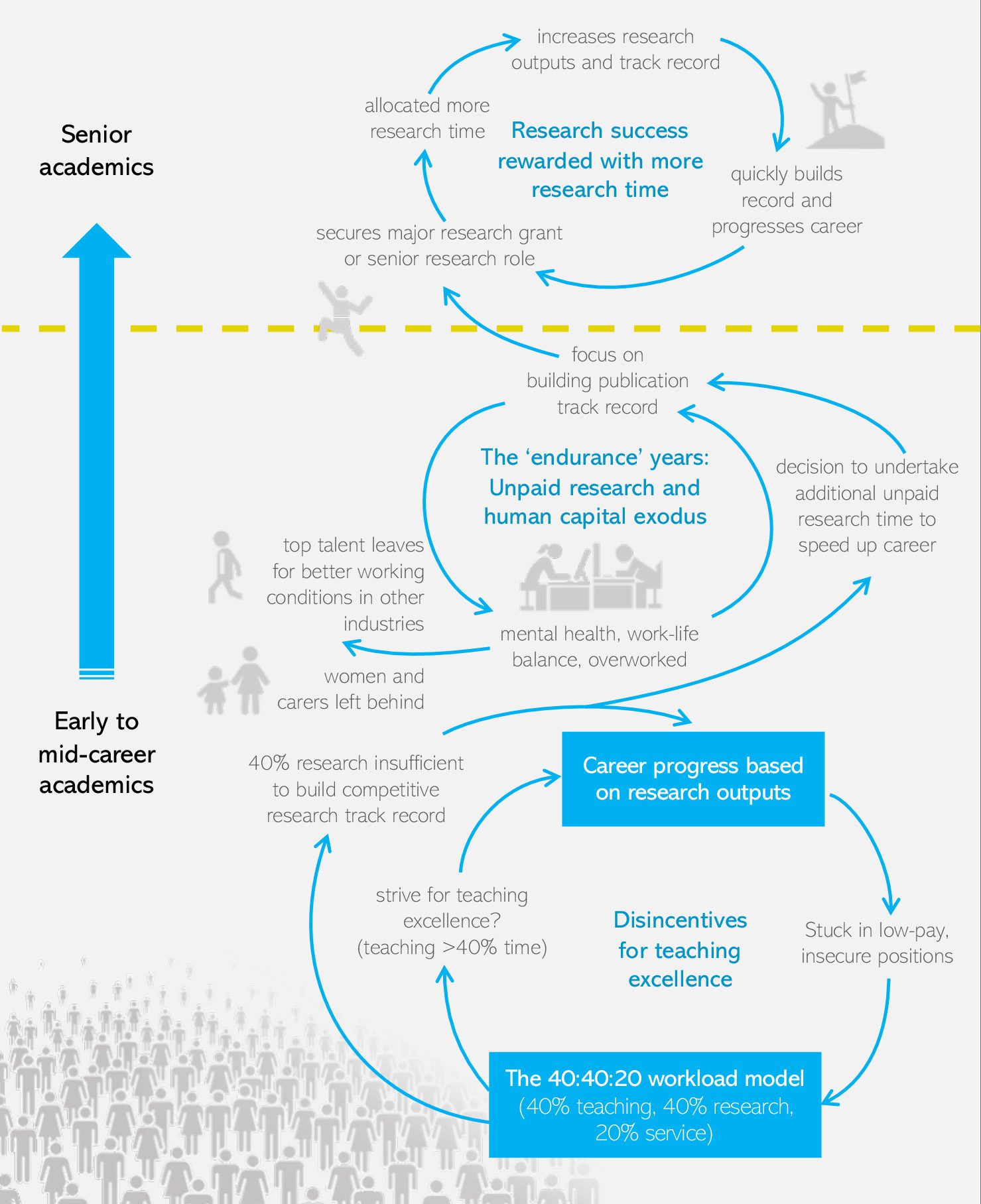No guarantees
in academia
Stakeholders spoke loud and clear about their discontents with career prospects in academia, some of which have been present for years. Most of these discontents are likely to impact academics across the board, not just in social science. Here are the highlights.
Overworked, insecure
A sizeable 44 stakeholders explicitly stated their research is often produced outside work hours. The work week is insufficient to both teach and maintain the research standards that would ultimately lead to career progression. For early and mid-career academics in insecure positions, fast-tracking their record in their “sleeping hours” is the best way to make it into the senior leagues. Since the extra hours are unreported, the extent of the problem remains unmeasured.
University employment shows some of the characteristics of a dual-labour market: where a section of staff has good employment conditions, including continuing appointments, and reasonable promotion prospects; while another faces insecure conditions (i.e., short-term, casual or fixed-term employment). The latter group is arguably more vulnerable to impact from the overwork culture and unpaid effort.
Questioning the nexus
Academics have traditionally been expected to undertake both teaching and research duties with the assumption that active researchers make better teachers. This idea is behind the 40:40:20 model, or the division of working hours into 40% teaching, 40% research, and 20% service and administration.
This model is not consistently applied across the sector, and there is increasing emphasis on a fourth dimension of external engagement (with media, industry partners etc). Stakeholders who did consider the suitability of the 40:40:20 model were divided evenly between those in favour and those against (49% and 51% respectively from 365 survey responses). Several also commented that the link between research and teaching quality has not been firmly established.
The main argument in favour of the model is that it introduces fairness: academics can claim a right to research time when they need it most (early years). Those against it argue few people have the talent and disposition to perform well in both areas. The alternative could be flexible contracts, to suit personal preferences, talent, and life and career stages. Emerging teaching-only and research-only roles offer a way out, but without teaching incentives in place, it’s a dead end for teaching-only staff.
For better or worse?
With tenured academic positions becoming scarcer, some stakeholders were worried that overall academic quality will be impacted. Non-permanent staff (particularly casuals) generally don’t get the same opportunities as ongoing employees, so are less likely to gain the experience and the rewards that lead to secure academic positions.
“[These] modes of working […] are most conducive to the foundational thought that brings about deep social change” (consultation submission).
Another scholar said:
“We’re gaining on research, but losing ‘scholarship’.” (consultation submission)
Others see brighter futures for academics:
“[They] will need to develop skills to move in and out of higher education, pivoting to government, non-government and private sectors […]. This could be a welcome trend, especially where academics can then re-enter higher education, bringing experiences from other sectors to benefit research and teaching quality” (consultation submission).
The wrong incentives
Teaching performance is said to be poorly measured (only through student satisfaction surveys) and disregarded when it comes to career progression. According to stakeholders, the situation does not only discourage teaching excellence, but leads to all sorts of distortions of the educational mission.
“Everyone tries to steal as much time as they can from the teaching and administration elements because they need to keep their research profile up. ERA is the only game in town. There are no rewards for teaching, as I have learnt over many years sitting on selection committees.” Emeritus Professor, University of Tasmania.
“When it comes to promotions and overall standing, you can be a terrible teacher and citizen but if you’ve got the right publications, you’ll be fine. This is SO wrong.” Mid-career academic, Australian National University.
Endurance myth
The potential consequences of a work culture where unpaid research time is the norm goes beyond lost wages. Below the surface, the academic ‘endurance’ ideal is leading to:
- A silent crisis of workplace health and safety, with academic staff sacrificing work-life balance and health over career progression. “We’re all overworked”.
- “The same gendered outcomes”, as women and others with caring responsibilities either leave the race, or stay permanently behind those who can use their time more flexibly.
- Loss of the best and brightest, who find their talent is rewarded better and sooner in other industries.
Currently, most academic staff I know are working around 40% above the notional annual hours set out in enterprise agreements
Senior academic, regional university.
Teaching well plus service takes up considerably more than 60% of an academic’s time. The norm is that if you want to get any research done (or really, just stay afloat with teaching) you will work more hours than you are paid for.
Mid-career academic, Group of Eight university.
Stakeholder perceptions of the unintended consequences of the research-centric culture
Based on findings of the consultation process

